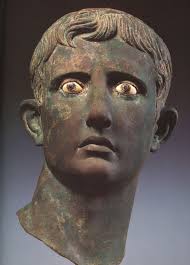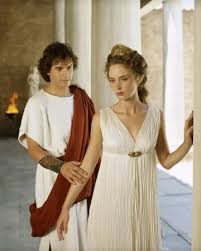Tags
Ancient Rome, Brutus and Cassius, Emily Blunt, Empire, Jonathan Cake, Julius Caesar, Movies I Hate, Octavian/Augustus, Roman Republic, Santiago Cabrera
Empire is quite possibly the worst thing I’ve ever watched on ancient Rome. I’ve gotten freshman term papers on ancient Rome that were way more interested in the facts than this piece of crap is. But I’m getting paid to review it, so I need to do another post on it. Please bear with me.

The plot of the series turns on the question of who Caesar’s heir will be. At the start of the series, Caesar (Colm Fiore) is correctly positioned as the dominant man in Rome, although it’s not explained how or why he got there, except that the crowds of Rome love him. Early on, Brutus (James Frain) and Cassius (Michael Maloney) comment that Caesar wants to be both king and god, statements that are fairly accurate for 44 BC. When Caesar is assassinated in the Senate chamber, he tells Tyrannus (Jonathan Cake) that his heir is going to be Octavius (Santiago Cabrera), not Mark Antony (Vincent Regan). This comes as a surprise to everyone, including Octavius, who was under the impression that Caesar despised him. Brutus and Cassius are desperately trying to get Caesar’s will so they can quash this, while Cicero (Michael Byrne) and Camane (an utterly wasted Emily Blunt) are doing everything they can to disseminate the will so that everyone in Rome will know the truth, so that the Senate will have to…make Octavius king maybe? Something like that. I’m not sure the series knows, but who cares? It’s only the main plot of the whole goddam thing.
The reality is, surprise surprise, different. Julius Caesar had no surviving children, despite three marriages, but his sister Julia did have a grandson, Octavius, who was the logical person to make his heir. So late in 45, Caesar wrote a will that adopted Octavius and bequeathing him about 75% of Caesar’s considerable fortune. The will would have been given to the Vestal Virgins, who were responsible for keeping wills, and would not have been publicly announced until after Caesar’s death. It is not known if Caesar told Octavius about the contents of his will, but it seems to me highly unlikely that the will would have been a surprise to Octavius; he was the obvious choice of heir being Caesar’s closest male relative, he was a canny and astute politician (as his entire political career demonstrated) who must have known what his position in Roman society was, and Caesar was smart enough to have recognized that he would have to groom Octavius as his successor (although he certainly didn’t foresee getting murdered just a half-year after making his will). Additionally, as soon as news of the assassination reached Octavius, who was in Apollonia on the west coast of Macedonia at the time, he immediately began to act like Caesar’s heir, ordering that Caesar’s war-chest be sent to him in Apollonia. If he was unaware of his status as heir, it’s improbable that he would have done this.
However, the series’ assumption that Octavius found his designation as heir a surprise is not an entirely outrageous one, because we have no formal evidence that he was told about it before Caesar’s murder. So I’ll reluctantly give the series a pass on this one.
(A short aside about names is necessary here. When he was born, he was given the name Gaius Octavius, since his father was from the Octavian gens. Upon his adoption, he legally became Gaius Julius Caesar Octavianus, the ‘an’ element signifying that he had been adopted out of the Octavian gens. After he achieved complete domination of the Roman political world in 27 BC, he was given the agnomen Augustus, which he consistently used down to the end of his life. There is no evidence that he ever actually styled himself Octavianus (although some of his opponents did). He preferred to refer to himself as Caesar and later Augustus Caesar, using the formal ‘Imperator Caesar Divi Filius Augustus’. However the universal modern historical convention is to call him Octavian (the anglicization of his name) for the period between 44 and 27 BC and then Augustus thereafter. Since his adoption was posthumous, the series is technically correct to call him Octavius, even though pretty much no one today ever uses his birth name unless they’re being super-precise.)

Octavian, being posthumously appalled by this series
According to Roman law, a posthumous adoption only applied to inheritance of property. Caesar had no legal way to pass on any of his formal political power or office, any more than John Kennedy could have bequeathed his presidency to one of his children, since in the Republic, all political offices were subject to public election and were not personal property. So what Octavian was technically inheriting was his adoptive father’s wealth and his name (since posthumous adoption typically required the adoptee to accept the adopter’s name). Informally, Octavian was inheriting the enormous goodwill the Roman crowd had for Caesar as well as the prestige of now belonging to perhaps the oldest and most glorious of all Roman gens. Since the anger of the crowd pushed the Senate to immediately declare the dead Caesar a god (something that Caesar seems to have been angling for already in the last year of his life), Octavian also acquired the huge and unprecedented clout of being able to style himself Divi Filius, ‘son of the god [Julius]’. In order to achieve his father’s political power, however, he was going to have use that inherited wealth, prestige, and goodwill to fight his way up to political power, especially because Mark Antony was the clear successor to Caesar’s military authority, since he was essentially Caesar’s lieutenant and an experienced soldier, while Octavian had no military experience to speak of, being only 18.
Whether his adoption surprised him or not, Octavian immediately moved to capitalize on the opportunity the adoption provided. As noted, he took charge of Caesar’s war-chest, sailed to Naples, and traveled north to Rome, collecting political support and a modest army along the way. He demonstrated a solid understanding of Roman politics, contacting key political figures for their support; he decision to land at Naples allowed him to meet up with Cornelius Balbus, one of Caesar’s most important supporters. At no point did he ever betray any sense that he was doing anything other than acting on his full legal rights as Caesar’s heir.
In Empire, however, Octavius is a cloth-headed idiot. When Tyrannus tells him that Caesar has named him his heir, Octavius initially refuses to believe it, and refuses to leave Caesar’s villa outside Rome until his mother warns him that he’s in a butt-load of danger and Tyrannus can protect him. Tyrannus insists on fleeing Rome entirely with no money or guards or anything else. The next morning, however, Octavius wakes up before Tyrannus, and rides back to Rome to see his girlfriend, some skank whose father is a senator but who immediately betrays him to the gladiator/soldiers who are looking for him. He gets chased, Tyrannus rescues him by magically knowing where he is, and Cicero gives them a list of supporters to track down. Then they ride out of Rome again. All of this is a real disservice to Octavian, who ranks among the savviest politicians in the history of the world.

Octavius and Camane, wishing they weren’t in this series
Brutus and Cassius, meanwhile, are torturing Octavius’ mother for the will, intimidating Cicero, and threatening the Vestal Virgins. They are having trouble with the crowd, which catches them trying to smuggle Caesar’s corpse out of the city, and seizes the corpse and burns it, which outrages Octavius even though it’s basically the way elite Roman funerals worked. Camane orchestrates a plan to produce dozens of copies of Caesar’s will and nail them up all around the city so everyone will know that Brutus and Cassius are dicks. They respond by lighting Rome on fire, which seems like something of an over-reaction, given that if the city is destroyed, there isn’t much of a Roman state for them to govern. Then they send an assassin after Octavius, but Tyrannus spots him because apparently in ancient Rome only assassins carry gladiator swords that are actually late medieval short-swords.
Then Octavius and Tyrannus run off to visit Senator Magonius (Dennis Haysbert), a black man who has a northern Celtic name at a time when senators were only drawn from Italy. Magonius refuses to give the gladiator/soldiers his legion (despite the fact that legions were only given to sitting or just-stepped down consuls at the authorization of the Senate). So, despite the legion Magonius owns, the gladiator/soldiers decide to make him a slave because in times of political unrest, historical accuracy is always the first casualty.

Brutus and Cassius with some woman who might be Servilla
Oh, and evidently because apostrophes haven’t been invented yet, the subtitles telling us where things happen never use apostrophes. So scenes take place at ‘Julius Caesar Villa’ and ‘Vestal Copy Room’.
You can do this, Andrew. You’re getting paid for this.
Want to Know More?
Well, if you insist, you can find Empire on Amazon.
There are lots of biographies of Augustus. The one I have on my shelf is Pat Southern’s Augustus.



Appreciate your setting the record straight – but really appreciate the “posthumously appalled” comment as well!
LikeLike
Two posts in one day Andrew! You must be very keen to be done with your assignment, lol. Hey, you should follow this review up with reviewing HBO’s Rome and then we will have beaten the proverbial dead horse deader than dead…
LikeLiked by 1 person
I am pretty sure I will need a break from Ancient Rome for a while.
LikeLike
No doubt! Some very serious and funny snark makes your pain worth it on this one.
LikeLike
Pingback: Empire: Oh, God, I Can’t Take This Anymore | An Historian Goes to the Movies
How can I find everything you’ve ever written about fictional accounts of history?! LOL
LikeLike
Well, it’s all here.
LikeLike